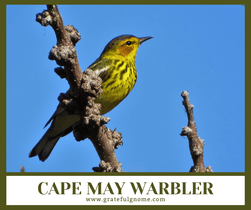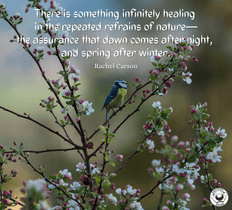


The Cape May Warbler is a mid-sized New World warbler and the only warbler with a tubular tongue adapted to feeding on nectar from flowers.

The Canada Warbler is a small boreal songbird, sometimes called the "Necklaced Warbler" because of the band dark streaks across its chest. It summers in Canada and northeastern United States and winters in northern South America.

The Blue-winged Warbler is a small songbird. Its name refers to the bluish-gray color of the wings that contrast with the bright yellow body of the male.

The Black-throated Gray Warbler is a small warbler having the same plumage color year round. It frequents pine and mixed pine-oak forests west of the Rocky Mountains and spends the winters farther south to Mexico.

The Black-faced Grassquit is a small bird that is recognized as a tanager closely related to Darwin's finches. It occurs in Bahamas Islands, and northwest of Isabela de Sagua, off northern Cuba.

The Hutton's Vireo is a small, stocky, thick-billed vireo of the western United States. It closely resembles the Ruby-crowned Kinglet.

The Gila Woodpecker is a noisy and very conspicuous medium-sized woodpecker of the desert regions of the southwestern United States and western Mexico.

The Hermit Warbler is a small, yellow-faced western warbler of wet conifer forests. It is more easily heard than seen.

The Zebra Finch is the most common songbird in Central Australia.

The Yellow-rumped Thornbill is a small, brownish bird with a distinctive yellow rump and dark thin bill. It is the largest species of thornbill, inhabiting savannah, scrub and forests across most of Australia.

The Yellow-legged Thrush is a songbird of northern and eastern South America.



398 Fischer Rd, Fort Mill, SC 29715
(844) 464-6463
(844) 464-6463

 © 2018
GratefulGnome.COM. All rights reserved |
Designed and Developed by CodingPixel |
Terms and Conditions |
Privacy Policy |
Shipping Policy
© 2018
GratefulGnome.COM. All rights reserved |
Designed and Developed by CodingPixel |
Terms and Conditions |
Privacy Policy |
Shipping Policy

